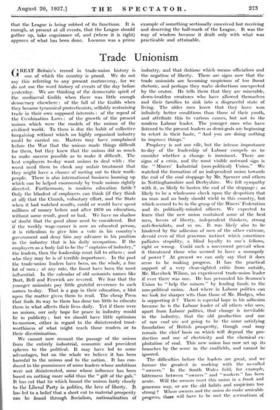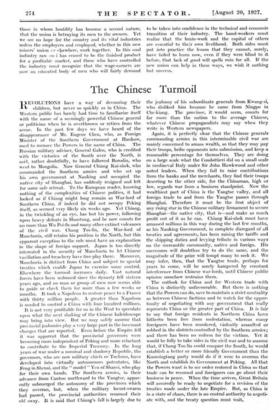Trade Unionism
GREAT Britain's record in trade-union history is one of which the country is proud. We do not say this referring to any present controversy, for we do not use the word history of events of the day before yesterday. We are thinking of the democratic spirit of the ►mediaeval Guilds when there was little enough democracy elsewhere : of the fall of the Guilds when they became tyrannical protectionists, selfishly restraining trade in their own supposed interests : of the repeal of the Combination Laws : of the growth of the present unions which were the models of the unions of the civilized world. To them is due the habit of collective bargaining without which no highly organized industry could be carried on. Masters may have complained before the War that the unions made things difficult for them, but they knew that the unions did as much to make success possible as to make it difficult. The best employers to-day want unions to deal with : the worst need them to check any unfair treatment that they might have a chance of meting out to their work- people. There is also international business looming up which can be helped enormously by trade unions rightly directed. Furthermore, is modern education futile ? Only the blindest of employers can think (if they think at all) that the Church, voluntary effort, and the State when it had watched results, could or would have spent millions of money before and after 1870 on education, without some result, good or bad. We have no shadow of doubt that the good alone need be considered. But if the weekly wage-earner is now an educated person, it is ridiculous to give him a vote in his country's government and deny him any advance in his position in the industry that is his daily occupation. If the employers as a body fail to be the " captains of industry," the leaders, then the leadership must fall to others ; and who they may be is of terrible importance. In the past the trade-union leaders have been, on the whole, a fine lot of men ; at any rate, the finest have been the most influential. In the calendar of old unionists names like Burt, Bell and Fenwick are revered. We fear that the younger unionists pay little grateful reverence to such names to-day. That is a gap in their education, a blot upon the matter given them to read. The cheap Press that finds its way to them has done too little to educate them in what affects their lives daily. Yet if there were no unions, our only hope for peace in industry would lie in publicity ; but we should have little optimism to-morrow, either in regard to the disinterested trust- worthiness of what might reach those readers or to their discrimination.
We cannot now recount the passage of the unions from the entirely industrial,- economic and provident spheres to the political. It may have led to some advantages, but on the whole we believe it has been harmful to the unions and to the nation. It has con- duced to the prominence of some leaders whose ambitions were not disinterested, some whose influence has been based on nothing more solid than the " gift of the gab." It has cut that tie which bound the unions fairly closely to the Liberal Party in politics, the love of liberty. It has led to a belief that a short cut to material prosperity can ' be found through Socialism, nationalization of industry,. and that etalisme which means officialism and the negation of liberty. There are signs now that the trade unionists are becoming suspicious of too fluent rhetoric, and perhaps they make deductions unexpected by the orator. He tells them that they are miserable, down-trodden creatures who have allowed themselves and their families to sink into a disgraceful state of living. The older men know that they have won infinitely better conditions than those of their youth, and attribute this to various causes, but not to the modern Labour leader. The younger ones who have listened to the present leaders as demi-gods are beginning to retort in their haste, " And you are doing nothing to improve things."
Prophecy is not our role, but the intense importance to-day of the leadership of Labour compels us to consider whether a change is imminent. There arc signs of a crisis, and the most visible outward sign is the " Miners' Industrial (non-political) Union." We watched the formation of an independent union towards the end of the coal stoppage by Mr. Spencer and others in Nottinghamshire and Derbyshire. We felt sympathy with it, as likely to hasten the end of the stoppage ; as likely to be a wholesome check upon the despotism that no man and no body should wield in this country, but which seemed to be in the grasp of the Miners' Federation and its politically-minded officers. We expected to learn that the new union contained some of the best men, lovers of liberty, independent thinkers, strong anti-Socialists, and so on. It was likely also to be hindered by the adhesion of men of the other extreme, devoid even of that generous instinct which sometimes palliates stupidity, a blind loyalty to one's fellows, right or wrong. Could such a movement prevail when it threatened those who seemed to have a monopoly of power ? At present we can only say that it doeS seem to be making progress. It has the practical support of a very clear-sighted critic from outside, Mr. Havelock Wilson, an experienced trade-union leader if ever there was one. He has persuaded his Seamen's Union to " help the miners " by lending funds to the non-political union. And where in Labour politics can we look for sharper wits than those of Mr. Hodges, who is supporting it ? There is especial hope in his adhesion because he is the Labour leader of all others who sees, apart from Labour politics, that change is inevitable in the industry, that the old production and use of raw coal are not going to be the same satisfying foundation of British prosperity, though coal may remain the chief basis on which will depend the pro- duction and use of electricity and the chemical ex- ploitation of coal. This new union has now set up its branches by the score in the coalfields, and cannot be ignored.
The difficulties before the leaders are great, and we foresee the greatest in working with the so-called " owners." In the South Wales field, for example, bitterness between "owners" and " workers " has been acute. Will the owners meet this union in a frank and generous way, or are the old. habits and suspicions too strong ? Where owners and the union do make amicable progress, there will have to be met the accusations of those in whom hostility has become a second nature, that the union is betraying its men to the owners. Yet we see no hope for the country and its vital industries unless the employers and employed, whether in this new miners' union or elsewhere, work together. In this coal industry raw co:1 has ceased to be the finished product for a profitable market, and those who have controlled the industry must recognize that the wage-earners are now an educated body of men who will fairly demand to be taken into confidence in the technical and economic transition of their industry. The hand-workers must realize that the brain-work and the capital of others are essential to their own livelihood. Both sides must put into practice the lesson that they cannot, surely, have failed to learn now, even if they were blind to it before, that lack of good will spells ruin for all. If the new union can help in these ways, we wish it nothing but success.



































 Previous page
Previous page